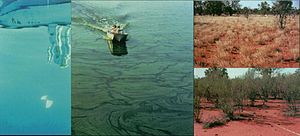
Back بوابة:علم البيئة Arabic Portal:Ecologia Catalan Portal:Økologien Danish Portal:Ecología Spanish درگاه:بومشناسی Persian Portail:Écologie French 포털:생태학 Korean Портал:Екологија Macedonian Portal:Ecologia Portuguese Portal:Ecologie Romanian
| |
|
|
Ecology
|
|
Ecology (from Ancient Greek οἶκος (oîkos) 'house' and -λογία (-logía) 'study of') is the natural science of the relationships among living organisms, including humans, and their physical environment. Ecology considers organisms at the individual, population, community, ecosystem, and biosphere levels. Ecology overlaps with the closely related sciences of biogeography, evolutionary biology, genetics, ethology, and natural history. Ecology is a branch of biology, and is the study of abundance, biomass, and distribution of organisms in the context of the environment. It encompasses life processes, interactions, and adaptations; movement of materials and energy through living communities; successional development of ecosystems; cooperation, competition, and predation within and between species; and patterns of biodiversity and its effect on ecosystem processes. Ecology has practical applications in conservation biology, wetland management, natural resource management (agroecology, agriculture, forestry, agroforestry, fisheries, mining, tourism), urban planning (urban ecology), community health, economics, basic and applied science, and human social interaction (human ecology). The word ecology (German: Ökologie) was coined in 1866 by the German scientist Ernst Haeckel. The science of ecology as we know it today began with a group of American botanists in the 1890s. Evolutionary concepts relating to adaptation and natural selection are cornerstones of modern ecological theory. Ecosystems are dynamically interacting systems of organisms, the communities they make up, and the non-living (abiotic) components of their environment. Ecosystem processes, such as primary production, nutrient cycling, and niche construction, regulate the flux of energy and matter through an environment. Ecosystems have biophysical feedback mechanisms that moderate processes acting on living (biotic) and abiotic components of the planet. Ecosystems sustain life-supporting functions and provide ecosystem services like biomass production (food, fuel, fiber, and medicine), the regulation of climate, global biogeochemical cycles, water filtration, soil formation, erosion control, flood protection, and many other natural features of scientific, historical, economic, or intrinsic value. (Full article...) Selected article - Lake and Mulga ecosystems with alternative stable states In ecology, resilience is the capacity of an ecosystem to respond to a perturbation or disturbance by resisting damage and subsequently recovering. Such perturbations and disturbances can include stochastic events such as fires, flooding, windstorms, insect population explosions, and human activities such as deforestation, fracking of the ground for oil extraction, pesticide sprayed in soil, and the introduction of exotic plant or animal species. Disturbances of sufficient magnitude or duration can profoundly affect an ecosystem and may force an ecosystem to reach a threshold beyond which a different regime of processes and structures predominates. When such thresholds are associated with a critical or bifurcation point, these regime shifts may also be referred to as critical transitions. Human activities that adversely affect ecological resilience such as reduction of biodiversity, exploitation of natural resources, pollution, land use, and anthropogenic climate change are increasingly causing regime shifts in ecosystems, often to less desirable and degraded conditions. Interdisciplinary discourse on resilience now includes consideration of the interactions of humans and ecosystems via socio-ecological systems, and the need for shift from the maximum sustainable yield paradigm to environmental resource management and ecosystem management, which aim to build ecological resilience through "resilience analysis, adaptive resource management, and adaptive governance". Ecological resilience has inspired other fields and continues to challenge the way they interpret resilience, e.g. supply chain resilience. (Full article...)Selected image - Credit: Composite image created by User:Medeis General imagesThe following are images from various ecology-related articles on Wikipedia.
Related WikiProjectsThings you can do
Entries here consist of Good and Featured articles, which meet a core set of high editorial standards.
 Aposematism is the advertising by an animal, whether terrestrial or marine, to potential predators that it is not worth attacking or eating. This unprofitability may consist of any defenses which make the prey difficult to kill and eat, such as toxicity, venom, foul taste or smell, sharp spines, or aggressive nature. These advertising signals may take the form of conspicuous coloration, sounds, odours, or other perceivable characteristics. Aposematic signals are beneficial for both predator and prey, since both avoid potential harm. The term was coined in 1877 by Edward Bagnall Poulton for Alfred Russel Wallace's concept of warning coloration. Aposematism is exploited in Müllerian mimicry, where species with strong defences evolve to resemble one another. By mimicking similarly coloured species, the warning signal to predators is shared, causing them to learn more quickly at less of a cost. (Full article...)Selected biography -
Howard Thomas Odum (September 1, 1924 – September 11, 2002), usually cited as H. T. Odum, was an American ecologist. He is known for his pioneering work on ecosystem ecology, and for his provocative proposals for additional laws of thermodynamics, informed by his work on general systems theory. (Full article...)
Did you know (auto-generated)
Selected quote -
Ecology news
Additional News Highlights
Selected publication -Conservation Biology is a peer-reviewed academic journal of the Society for Conservation Biology, published by Wiley-Blackwell. Conservation Biology publishes articles covering the science and practice of conserving Earth's biological diversity. Coverage includes issues concerning any of the Earth's ecosystems or regions, and that apply different approaches to solving problems in this area. (Full article...) Related portalsMore did you know -Related articlesAssociated WikimediaThe following Wikimedia Foundation sister projects provide more on this subject:
Web resourcesPreview warning: Page using Template:Div col with unknown parameter "1 = 2"; use colwidth= to specify column size
Discover Wikipedia using portals |













































